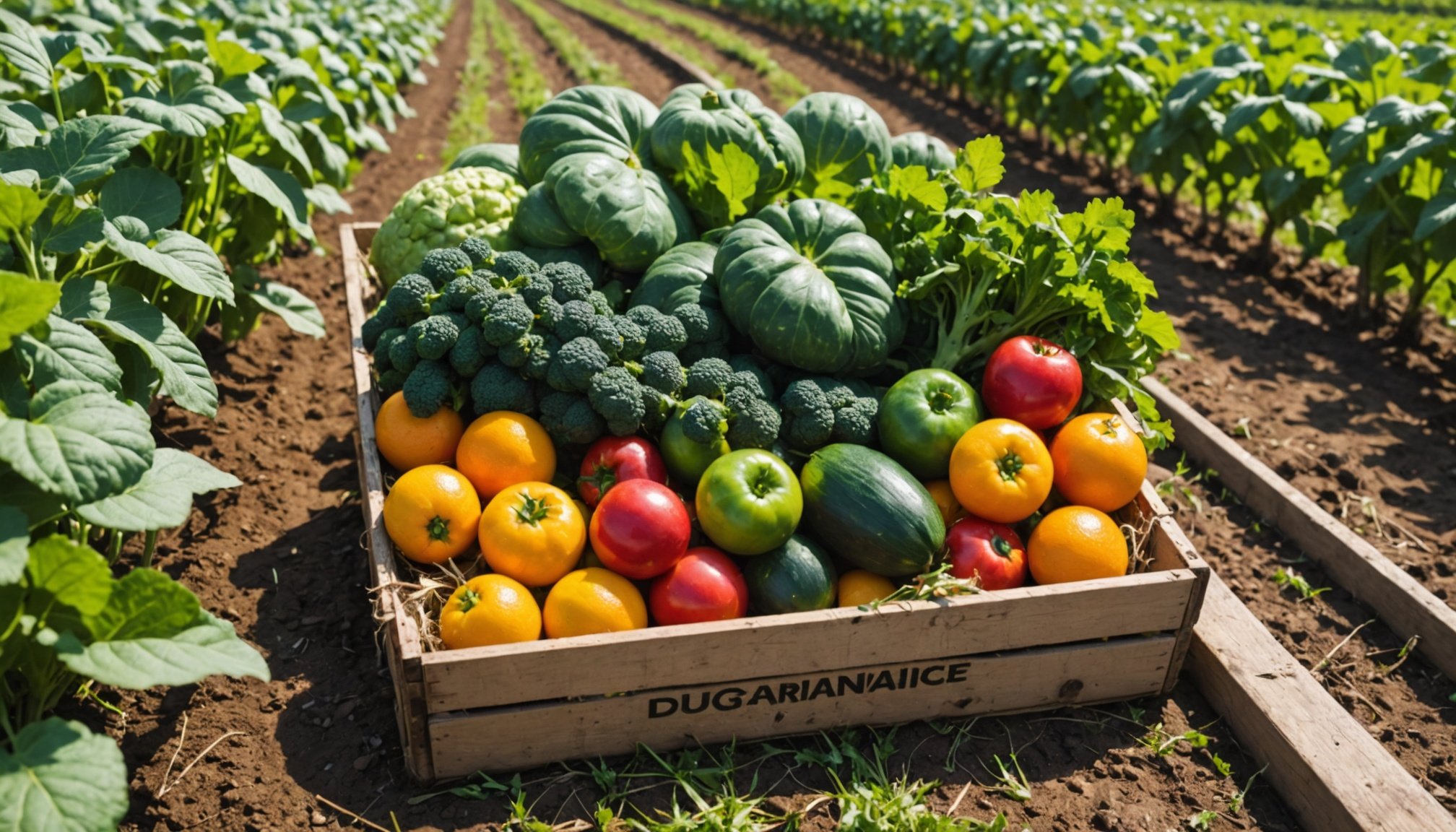Overview of Blockchain Technology in the Food Supply Chain
Blockchain technology is revolutionising the food supply chain by significantly enhancing both transparency and traceability. At its core, this technology operates as a decentralised ledger that records transactions across multiple computers. Each block in this chain—containing information like time, date, and transaction details—is immutable, making the data tamper-proof. This characteristic is essential for building trust, particularly within more sensitive markets such as organic food.
In these markets, trust is paramount. Blockchain ensures that every step in the supply chain is transparent, from production to delivery. This transparency not only reassures consumers about the authenticity of their organic purchases but also helps retailers monitor the quality and origin of products. It prevents misinformation and fraudulent claims about organic status, thus upholding brand integrity and consumer trust.
Also read : Sustainable Packaging Innovations: A Comprehensive Guide for UK Cosmetics Companies
Moreover, by verifying each transaction on the blockchain, stakeholders can efficiently trace the movement of goods, allowing for rapid responses to any issues, such as potential food safety breaches. Through this functionality, blockchain promotes a direct, clear line of communication and accountability, changing the way organic foods and their supply chains are perceived and managed.
Benefits of Blockchain for the Organic Food Sector
The organic food sector is poised to reap significant advantages from blockchain technology, particularly in enhancing trust and transparency across the supply chain. One crucial benefit is increased traceability, allowing stakeholders to track products from farm to fork. This transparency ensures that consumers receive genuine organic products, fostering trust and brand loyalty.
Also read : Essential Tactics to Protect Your UK FinTech Startup: An In-Depth Handbook
Additionally, blockchain serves as a robust solution for reducing fraud. By securely logging transactions and product histories, it minimizes the risk of false claims and fraudulent activities. This ensures authenticity, bolsters food safety, and provides the means for rapid identification and resolution of safety breaches. The immutable nature of blockchain records offers a tamper-proof way to store and verify data, essential for maintaining consumer confidence.
Moreover, blockchain enhances supply chain efficiency. By streamlining processes and reducing the need for intermediaries, blockchain reduces time and costs associated with transactions. Stakeholders benefit from more accessible, real-time data management, fostering cost-effectiveness throughout the supply journey. As the organic food sector continues to evolve, integrating blockchain builds resilience, propelling it towards greater operational efficiency and reliability.
Case Studies of Blockchain Implementation in the UK Organic Food Market
Exploring real-world blockchain case studies within the UK organic food market reveals compelling insights into this transformative technology.
Case Study 1: Provenance
Provenance stands out as a pioneer in blockchain applications, particularly within organic food retail. By enabling product tracking from origin to consumer, Provenance boosts transparency and strengthens consumer trust. Their blockchain system documents each step of the supply chain, validating claims about organic status and improving accountability.
Case Study 2: The Co-operative Group
The Co-operative Group in the UK has embraced blockchain to enhance operational efficacy and customer confidence. By guaranteeing the authenticity of its organic offerings, it directly addresses concerns regarding mislabeling and traceability. The blockchain network they’ve implemented ensures product histories are accessible and verifiable.
Case Study 3: Growing Underground
Growing Underground leverages blockchain for urban farming in London, focusing on sustainability and consumer engagement. Their use of blockchain ensures transparent records of cultivation processes, giving consumers insight into their purchase journeys. The ability to trace origins directly elevates brand reliability, encouraging informed purchasing decisions.
These case studies illustrate blockchain’s ability to improve reliability and consumer trust across diverse facets of the UK organic food sector.
Challenges and Limitations of Blockchain Adoption
In the organic food sector, several challenges hinder the widespread adoption of blockchain technology. Technological barriers are one of the most significant issues, particularly when integrating blockchain with existing systems. Many small producers find it daunting to upgrade their technological infrastructure, which is often necessary to support blockchain operations. This leads to adoption hurdles as businesses struggle to adapt to newer technologies without disrupting their core operations.
Furthermore, regulatory and compliance challenges add layers of complexity. Different jurisdictions have various regulations regarding data management and blockchain implementation. Navigating these inconsistent legal landscapes can be perplexing for businesses aiming to remain compliant with international and local laws.
The cost concerns for smaller producers and businesses present another significant limitation. Implementing blockchain systems can be expensive, with costs related to acquiring technology, training staff, and ongoing maintenance. These financial demands can be challenging for smaller entities with limited budgets, making it difficult to invest in blockchain.
In essence, while blockchain offers numerous benefits for transparency and traceability, overcoming these barriers requires concerted efforts involving technological innovation, regulatory cooperation, and financial resource allocation.
Consumer Perspectives on Food Authenticity and Traceability
Amidst increasing demand for transparency in food sourcing, consumers are placing higher value on food authenticity and traceability than ever before. This trend is driven by frequent concerns over food safety and the desire for sustainable practices. As a result, blockchain technology finds itself uniquely positioned to meet these evolving expectations by offering immutable records that verify the origin and journey of food products.
Survey data suggests a notable shift in consumer attitudes towards blockchain. Many see it as a crucial tool for ensuring that the food they purchase is genuinely organic and ethically sourced. However, despite the potential benefits, a gap persists in consumer understanding of the technology’s capabilities and operations.
Education thus plays a pivotal role in bridging these knowledge gaps. By investing in consumer education, companies can enhance trust and acceptance of blockchain solutions. As a result, this will empower consumers to make informed decisions based on verified information rather than claims. The integration of blockchain into the food industry not only helps dispel doubts about food authenticity but also contributes to a culture of awareness and informedness among consumers.
Expert Opinions on Future Trends in Blockchain and Organic Food
Exploring expert opinions reveals insightful predictions about blockchain future trends within the organic food market. As the sector evolves, industry specialists forecast a notable shift towards increased adoption and innovation.
Potential innovations are emerging, with advancements emphasizing interoperability between blockchain systems and other technologies like IoT (Internet of Things) and AI (Artificial Intelligence). These integrations could refine supply chain mechanisms by enhancing data accuracy and real-time monitoring, thereby bolstering safety measures and product authenticity.
Predictions extend towards profound consumer behavior changes. As blockchain technologies gain prominence, consumers may lean heavily on verified data for purchasing decisions, which demands increasing transparency and trust. Customised consumer experiences could become a focal point, where blockchain aids in personalising interaction based on verified customer preferences.
Long-term market dynamics may also pivot, with blockchain potentially transforming not just retailers and producers, but entire global supply chains. Experts anticipate that as blockchain-based systems become more mainstream, they will fortify market resilience by mitigating risks and fostering sustainable business practices. These future trends could redefine the rhythms of the organic food market, embedding trust into its very infrastructure.





